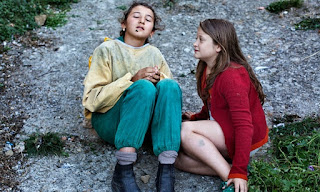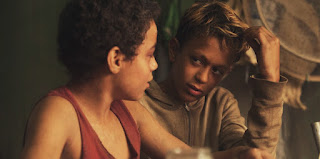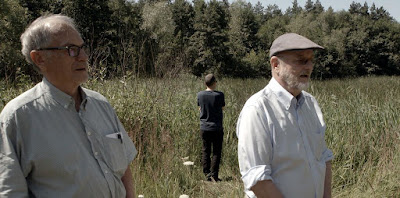 In this new mouth watering movie from the Weinstein Company there are three things that are hot. The food, the tempers and the star Bradley Cooper. It's not the first time he has tried his hand at playing a temperamental master chef: back in 2005 he was in the very short-lived Fox TV series 'Kitchen Confidential' based on the life of Anthony Bourdain. Now he is back playing Adam Jones an ex-pat American in London trying to get his 'A' game back after having an almighty meltdown in Paris due to an expensive drug habit and an ability to wreck everything good in his life including the Michelin Two Star restaurant whose premature closure he apparently brought about.
In this new mouth watering movie from the Weinstein Company there are three things that are hot. The food, the tempers and the star Bradley Cooper. It's not the first time he has tried his hand at playing a temperamental master chef: back in 2005 he was in the very short-lived Fox TV series 'Kitchen Confidential' based on the life of Anthony Bourdain. Now he is back playing Adam Jones an ex-pat American in London trying to get his 'A' game back after having an almighty meltdown in Paris due to an expensive drug habit and an ability to wreck everything good in his life including the Michelin Two Star restaurant whose premature closure he apparently brought about.
For some unexplained reason he has been redeeming himself by shucking oysters in a New Orleans dive for the past two years and getting 'clean' at the same time. Now he's back in London penniless and with a single purpose in mind : to open a restaurant to get an elusive third Michelin star. It's not going to be easy as it seems that half the capital city has a grudge to bear against this rather arrogant man, although they all seem eager enough to line up to proclaim that he is possibly the best chef in the world.
He does however manage to persuade a very reluctant Tony a Maitre D' at his family owned high-end Hotel to hand over his restaurant to help him achieve his goal. Like so many others in this drama, Tony keeps cryptically referring to their past experiences together and 'what happened in Paris' but without ever going into any real detail. The only reason that he is prepared to try to forgive and forget is that he has a bad case of unrequited love for Adam. Next Adam sets about gathering together his hand-picked motley crew of young talented chefs to cook with him. They include Michel who initially expresses his anger at Adam for being responsible for him losing his own restaurant in Paris, but then who begs him for a job. Plus there is an ex-con Italian just released from Prison, and a very nervous young Brit chef who has to even put Adam up on his own couch initially when he is homeless.
 The only female in the team is Helene a single mother and an exceptional sous chef who is the one who takes the longest to fall for Adam and his genius as he treats her even worse than anyone else in his new kitchen. When things start cooking he is always on an angry rampage doing his very best Gordon Ramsay impression hurling china and abuse every single second he doesn't get his own way, which in this culinary melodrama, is quite often.
The only female in the team is Helene a single mother and an exceptional sous chef who is the one who takes the longest to fall for Adam and his genius as he treats her even worse than anyone else in his new kitchen. When things start cooking he is always on an angry rampage doing his very best Gordon Ramsay impression hurling china and abuse every single second he doesn't get his own way, which in this culinary melodrama, is quite often.
There are also angry encounters with a chef from a another highly successful restaurant, plus temper tantrums with anyone who isn't going to help him achieve the ultimate Michelin accolade. The only people that seem to get the better of him ....physically anyway ..... are the drug dealers trying to collect from him all the monies he owes for 'what happened in Paris'. However, with only one minor unexpected twist to this plot, it is very obvious that Adam will always get his own way, even with Helene no matter how bad he treats her.
Bradley Cooper puts in a passionate performance as the fiery megalomaniac who is obsessed and has to deal with his inner demons as a perfectionist wanting to achieve his ultimate goal. He does however look in far better physical shape than one would
expect from someone who has allegedly been abusing his body for years ....but this is a movie after all. The co-star of the movie is undoubtedly the food ... top Brit chef Marcus Waring who has his own Michelin 2 Star Restaurant in London, was the consultant .... and director John Wells ensures the camera lingers long enough to have you salivating through a good part of the movie.
There is a great international supporting cast headed by Sienna Miller who is a very spirited Helene, Daniel Brühl as lovelorn Tony, Riccardo Scamarcio as ex con Max, Omar Sy as Michel, Matthew Rhys as Adam's bete noire Reiss, and in two cameo roles Uma Thurman and Alicia Vikander. In every movie these days there is always one scene stealer, and in this instance it is the ever wonderful Emma Thompson in a very small but crucial role as the Therapist hired to ensure that Adam doesn't relapse into his old bad habits.
What the movie lacked however, was that special ingredient similar to the problem that Adam had in his kitchen trying to avoid his dishes being just mundane. There were too many aspects of the story that even the actors seemed to have trouble been convinced about and it certainly wasn't helped with rather stomach churning grandiose statements like Adam declaring 'I want to make food that makes people stop eating'.
Adam had a very simple mantra in the kitchen of 'if it's not perfect, you throw it way' which is far too tough to apply to the movie itself. After all we can enjoy food without a Michelin star then we can also enjoy a movie that is certainly not going to win any awards any time soon as it is still very palatable.
★★★★★★
 The only female in the team is Helene a single mother and an exceptional sous chef who is the one who takes the longest to fall for Adam and his genius as he treats her even worse than anyone else in his new kitchen. When things start cooking he is always on an angry rampage doing his very best Gordon Ramsay impression hurling china and abuse every single second he doesn't get his own way, which in this culinary melodrama, is quite often.
The only female in the team is Helene a single mother and an exceptional sous chef who is the one who takes the longest to fall for Adam and his genius as he treats her even worse than anyone else in his new kitchen. When things start cooking he is always on an angry rampage doing his very best Gordon Ramsay impression hurling china and abuse every single second he doesn't get his own way, which in this culinary melodrama, is quite often.There are also angry encounters with a chef from a another highly successful restaurant, plus temper tantrums with anyone who isn't going to help him achieve the ultimate Michelin accolade. The only people that seem to get the better of him ....physically anyway ..... are the drug dealers trying to collect from him all the monies he owes for 'what happened in Paris'. However, with only one minor unexpected twist to this plot, it is very obvious that Adam will always get his own way, even with Helene no matter how bad he treats her.
Bradley Cooper puts in a passionate performance as the fiery megalomaniac who is obsessed and has to deal with his inner demons as a perfectionist wanting to achieve his ultimate goal. He does however look in far better physical shape than one would
expect from someone who has allegedly been abusing his body for years ....but this is a movie after all. The co-star of the movie is undoubtedly the food ... top Brit chef Marcus Waring who has his own Michelin 2 Star Restaurant in London, was the consultant .... and director John Wells ensures the camera lingers long enough to have you salivating through a good part of the movie.
There is a great international supporting cast headed by Sienna Miller who is a very spirited Helene, Daniel Brühl as lovelorn Tony, Riccardo Scamarcio as ex con Max, Omar Sy as Michel, Matthew Rhys as Adam's bete noire Reiss, and in two cameo roles Uma Thurman and Alicia Vikander. In every movie these days there is always one scene stealer, and in this instance it is the ever wonderful Emma Thompson in a very small but crucial role as the Therapist hired to ensure that Adam doesn't relapse into his old bad habits.
What the movie lacked however, was that special ingredient similar to the problem that Adam had in his kitchen trying to avoid his dishes being just mundane. There were too many aspects of the story that even the actors seemed to have trouble been convinced about and it certainly wasn't helped with rather stomach churning grandiose statements like Adam declaring 'I want to make food that makes people stop eating'.
Adam had a very simple mantra in the kitchen of 'if it's not perfect, you throw it way' which is far too tough to apply to the movie itself. After all we can enjoy food without a Michelin star then we can also enjoy a movie that is certainly not going to win any awards any time soon as it is still very palatable.
★★★★★★




























